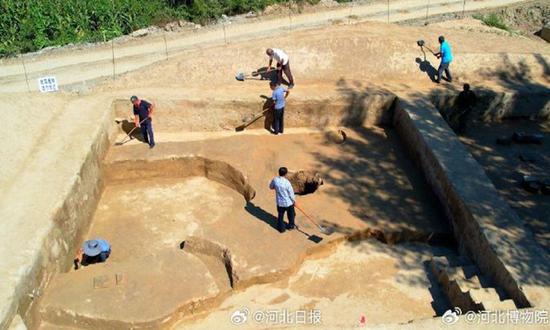Discovery of Song Dynasty temple site sheds light on China's Taoist culture

Workers clear the excavation site in Wuyi county, Hengshui, North China’s Hebei Province. (Photo/Courtesy of Hebei Museum)
The ruins of a Taoist temple from the Song Dynasty (960 – 1279) were unearthed in Wuyi county, Hengshui, North China's Hebei Province, after a three-month long dig, the Hebei Museum announced on China's Twitter-like Sina Weibo on Saturaday.
“The discovery is of great value for studying the spread of ancient Taoist culture in our country and the ancient folk culture and local customs in the central and southern regions of Hebei,” wrote the post.
The joint archaeological team was composed of researchers from the Hebei Provincial Institute of Cultural Relics and Archaeology, Hengshui and the Wuyi county Cultural Relics Protection Department.
Guo Jiqiao, a researcher at the Hebei Provincial Institute of Cultural Relics and Archaeology, introduced that the joint archaeological team discovered two architectural relics sites, one water ditch, two wells, seven ash pits, and three stoves, all located across an area of about 400 square meters.
The unearthed cultural relics include some architectural components, daily necessities and production tools, most of which date to the Song Dynasty, along with a small amount of Tang Dynasty (618–907) and Jin (1115–1234) relics.
Jia Guihu, the director of the Wuyi County Cultural Relics Protection Office, introduced that the two architectural relics excavated this time include a soil platform and a Taoist building. The unearthed porcelain and the craftsmanship, shape, and decorations of the relics all showed obvious Song Dynasty characteristics. After expert analysis by the joint archaeological team, the site was confirmed to be a Taoist temple from the Song Dynasty.
